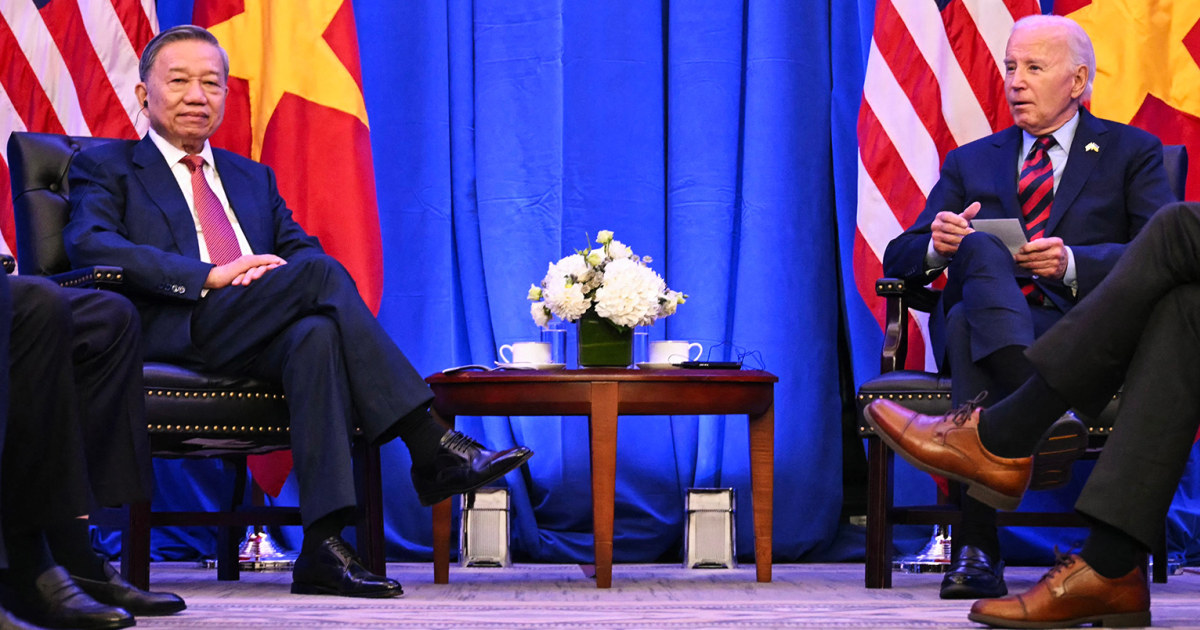NEW YORK — President Joe Biden met with Vietnamese President To Lam for talks on Wednesday, aiming to deepen relations with the Southeast Asian country and manufacturing hub and counter its ties with China and Russia.
Biden and Lam, the ruling Communist Party chief making his first visit to the U.S. as president, met on the sidelines of the United Nations General Assembly in New York. A senior U.S. official said they discussed how to accelerate a strategic partnership agreed last year.
On meeting Biden on Wednesday, Lam hailed what he called Biden’s historic contribution to elevating bilateral relations.
Biden said that since beginning a new era in relations last year, the two countries had made significant investments in semiconductors and supply chains and launched unprecedented cooperation on cybersecurity.
He also said they stood united in commitments to freedom of navigation and the rule of law, a reference to regional maritime disputes with China.
The Vietnam News Agency reported Lam told Biden that Vietnam was on the brink of a new era of development, and that it was a friend and reliable partner.
“Vietnam will continue to firmly implement its foreign policy of independence, self-reliance, multilateralism and diversification,” Lam told Biden, the state media agency reported. Lam met this week in New York with representatives of U.S. companies, including Meta, which pledged to expand investments in the country with a population of 100 million.
Lam asked business leaders to back Hanoi’s bid to have Washington remove it from the list of non-market economies and lift other trade restrictions and for the U.S. and Vietnam to cooperate on semiconductor supply chains.
Biden visited Hanoi a year ago and secured deals on semiconductors and minerals and an upgrade in diplomatic ties, despite U.S. concerns about human rights issues.
U.S. Rep. Michelle Steel, a California Republican who represents a large population of Vietnamese Americans, wrote to Biden before the meeting asking him to directly address human rights abuses in Vietnam under Lam’s leadership.
Asked if Vietnam’s NME status was discussed, the senior U.S. official told reporters: “They talked about economic cooperation broadly and plans to redouble cooperation with Vietnam.”
Asked if they discussed China, the official said: “The leaders acknowledged the fact that Vietnam lives in a complicated neighborhood.”
He said there was a recognition that Hanoi “has to be very cautious and strategic to its approach to the region” and that the United States is a strategic partner.
Alexander Vuving, a Vietnam expert at the Hawaii-based Inouye Asia-Pacific Center for Security Studies, said the meeting was important for helping Lam consolidate power after being confirmed as Vietnam’s top leader in August.
He said it signaled Vietnam’s balanced position between the great powers, given Lam’s recent visit to China and meetings with Russian President Vladimir Putin as well as the importance of the Hanoi relationship in U.S. Asia policy.
Lam spoke at the U.N. General Assembly on Tuesday, and his travels include a stop in Cuba, Vietnam’s long-term Communist partner.
Vietnam has long argued it should be freed of the NME label given recent economic reforms and that retaining the moniker is bad for increasingly close two-way ties that Washington sees as a counterbalance to China.
However, Murray Hiebert, a senior associate in the Southeast Asia Program at Washington’s Center for Strategic and International Studies, said it was not Biden’s prerogative to offer concessions on that, given Commerce Department criteria.
Opponents, including politically influential U.S. labor lobbies, argue Vietnam’s policy commitments have not been matched by concrete actions and that it is increasingly being used as a manufacturing hub by Chinese firms to circumvent U.S. curbs on imports from China.


